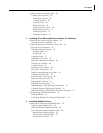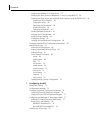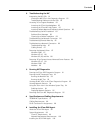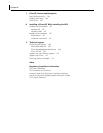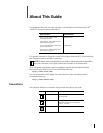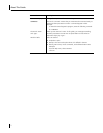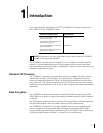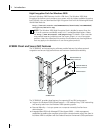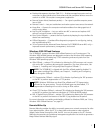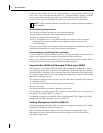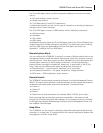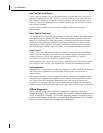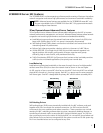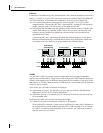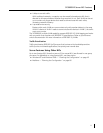
3C990B Client and Server NIC Features
5
■
Desktop Management Interface (DMI) 2.0 — Enables managed computers and net
computers to report details about themselves and their peripheral devices across the
network to a DMI 2.0-compliant management application.
■
Remote System Alerts (heartbeat packets) — Can signal a possible computer power
loss or theft.
■
Remote Control — Lets you troubleshoot and resolve system issues across the network.
■
Keep-Alive — Prevents the computer workstation address from being aged-out of
switch router tables.
■
Hot Plug NIC Installation — Lets you add a new NIC or remove and replace a NIC
without turning off power to the computer.
■
Flow Control Features — prevents the loss of packets by keeping the input buffers of a
device from overflowing.
■
Offline Diagnostics — Provides offline diagnostics programs for configuring, testing,
and troubleshooting NICs.
■
3Com DynamicAccess Advanced Server Features (for 3C990BSVR server NICs only) —
Improved network performance, management, and control.
Windows 2000 Offload Features
The 3C990B NIC supports Windows 2000 offload features in an IP environment. The
Windows 2000 offload features are designed to enhance the Windows 2000 operating
system capabilities by off-loading key TCP/IP networking and security tasks from the
Windows 2000 operating system:
■
IPSec Offload — reduces CPU utilization by allowing the 3XP processor and a crypto
chip on the NIC to perform data encryption operations. (For more information, see
Chapter 4, “Installing and Configuring Data Encryption Offloads.”)
■ TCP Segmentation Offload — reduces CPU utilization by allowing the 3XP processor
on the NIC to perform segmentation of TCP packets.
■ IP and TCP Checksum Offload — reduced CPU utilization by allowing the 3XP processor
on the NIC to perform the checksum calculation of TCP/IP and UDP/IP packets.
■ 802.1P Packet Priority Offload — reduces CPU utilization by allowing the 3XP processor
on the NIC to perform the insertion of the 802.1Q tag header into the packet.
For more information on enabling and disabling offloads for Windows 2000, see “Using
Windows 2000 Offload Features” on page 52.
Remote Wake-Up
Remote Wake-Up provides the ability to remotely power-on a network computer for after-
hours administration. When the PC is in sleep mode and receives a wake-up packet
(Magic Packet frame) through the LAN, the NIC turns on the power to the PC. Remote
Wake-Up also requires using a desktop management application that is able to generate a
Magic Packet Remote Wake-Up signal.
NOTE: The 3C990B NIC is shipped with the IPSec offload capability disabled. To
learn about enabling IPSec offloads, see Chapter 4, “Installing and Configuring
Data Encryption Offloads.”
NOTE: Windows 2000 does not allow IPSec offloads and TCP Segmentation
offloads for the same session. Though all offload types may be enabled, TCP
Segmentation offloading will not occur during an IPSec session.



